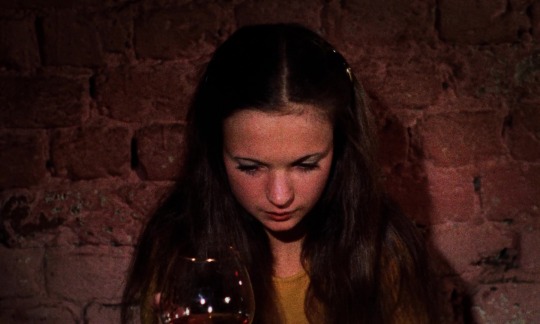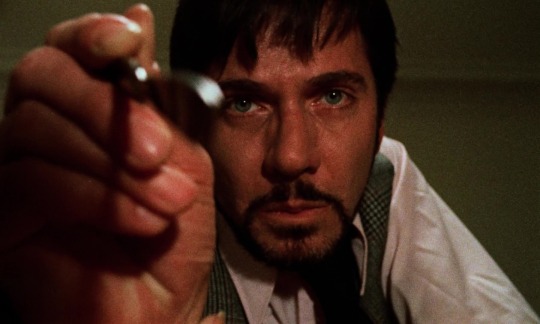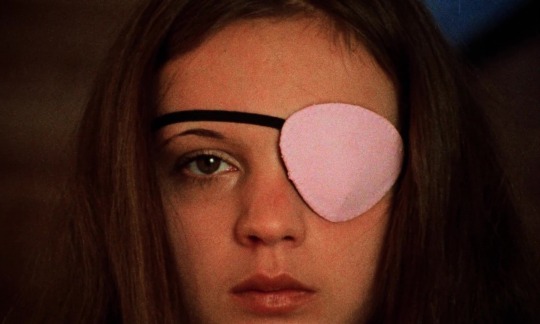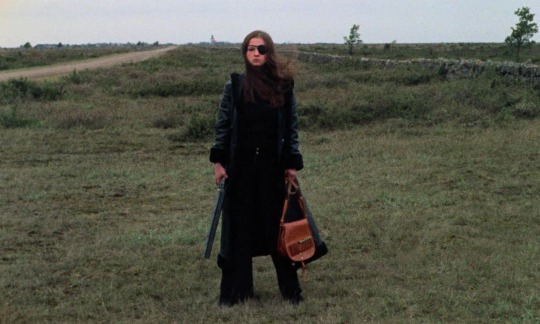#Swedish rape-and-revenge exploitation film
Photo






Thriller – A Cruel Picture (1973)
#Thriller – A Cruel Picture#1973#70's#70s#Swedish rape-and-revenge exploitation film#rape-and-revenge exploitation film#Christina Lindberg#heroin addiction and prostitution#They Call Her One Eye#Hooker's Revenge#The Swedish Vice-Girl#Madeleine / Frigga#Christina Lindberg as Madeleine / Frigga
431 notes
·
View notes
Text
1970s: Exploitation Horror
The 1970s were a strange period in history, and that oddness shows through in the horror of the time. The decade is a grab-bag of content, featuring the rise of some of the best-known tropes and landmark films of the genre, but also some really baffling, awful movies.
We decided to launch our journey through the decade by getting one of its most unnerving trends checked off the list early: the exploitation film.
The death knell of the Hays Production Code and the moral gatekeeping by the 1960s left a period of cinematic anarchy. The MPAA would take a bit to solidify our modern rating system and lay out the rules for film content, so for a while the only real limitation on movie content was what a movie theater would play. These decisions came on a case-by-case basis, and so-called “grindhouse” theaters capitalized on it by offering the kind of shocking, low-brow, vulgar or otherwise unpalatable content other theaters wouldn’t touch.
Thus, “exploitation” films were all about exploiting the tumultuous times in cinema.
One popular genre to crop up in this setting was the rape-revenge movie. The basic formula: a woman is raped, left for dead, and returns to wreak bloody vengeance on her attacker(s). The plot provides an excuse to show both graphic sex and violence, which is like a 2-for-1 exploitation buffet and also incidentally the theme of this week’s film series.
Analysis below the cut!
First up: I Spit On Your Grave
youtube
This 1974 film, written and directed by Meir Zarchi, is probably the best-known and possibly best-made of the rape-revenge movies of the era. It’s also incredibly hard to watch.
The story is straightforward. Jennifer, a female author, moves to a remote summer home to work on her novel. There she attracts the attention of a group of men, including one mentally challenged delivery boy named Matthew. Matthew’s friends are assholes, and they goad him about the “crush” he has on this fancy city woman, and decide it would be entertaining for him to lose his virginity to her. So they, uh, harass her, physically assault her, and take turns raping her before leaving Matthew to kill her (he doesn’t, and lies to his friends about it, leaving her beaten but alive and thus able to exact revenge).
There are several things about this movie that are noteworthy:
It portrays the rape in the least-sexy, least-romanticized way imaginable. It is not titillating or exciting in any way. The rape sequence lasts for 30 minutes of film time, and they are excruciating to watch. There is no soundtrack, so you have only the flat silence punctuated by screams, grunts, and scant dialogue. The camera is often stationary, focused on the scene as an objective viewer rather than spending a lot of time cutting and zooming -- putting the audience in the role of helpless witness.
The character of Matthew is interesting and, honestly, sympathetic. It’s pretty clear that he has the intellect of a child, and he has no real idea of what’s really going on. He’s goaded and pressured into participating, and he’s reluctant and tries several times to stop and escape. In a way, he’s a victim almost as much as Jennifer.
The second half of the film is pure revenge fantasy. Jennifer is transformed. She is suddenly cool, calculating, physically capable, and able to deliver cutting one-liners. The villains, never the sharpest tools in the shed, transform into unbelievably stupid caricatures capable only of thinking with their dicks. Jennifer systematically seduces and murders them in increasingly violent ways.
It’s probable that the film’s events are meant to be taken at face value, but I think a more interesting read on the story is that the second half -- the revenge portion -- is literally a fantasy. After the attack, we see Jennifer spend some time recovering physically, then piecing together the torn pages of her manuscript before sitting down to write. Perhaps, then, the revenge is happening on the page rather than in reality. Perhaps she has put together the pieces of her life and rewritten her narrative such that she can take control of her sexuality and work through her anger and grief and pain.
Maybe it’s just the writer in me, but I think that’s a cool interpretation and one that makes a lot of sense in context.
Either way: I Spit On Your Grave is an uncomfortable but well-made film that’s worth talking about. There’s a lot of controversy surrounding it even to this day (and it was a box office disaster, grindhouse or no), but I think on the balance it’s ultimately a feminist film, or at least a sympathetic one.
Note: There was a remake and multiple sequels released in the 2010s. I haven’t seen any of them, but my understanding is they’re more over-the-top violent and sensationalized, and I can’t help but suspect that cheapens the brutal elegance of the original. If you’ve seen them, feel free to weigh in!
The second film of the night was The Last House on the Left.
youtube
Wes Craven’s directorial debut, The Last House on the Left (1972) tells the story of two teenage girls who run afoul of a gang of psychotic thugs who kidnap, torture, rape, and eventually murder them. The thugs then end up coincidentally at the house of one victim’s parents, who exact their revenge after discovering their daughter’s body dumped in the woods nearby and put two and two together.
All I can say is: What the fuck did I just watch.
I’d never seen this movie, although I was familiar with it by reputation. It’s famous, and I heard good things about its 2009 remake. What nobody thought to warn me about is the goddamn soundtrack.
I can respect the artistic technique of pairing graphic violence with tonally inconsistent music as a way to create dissonance and cause audience discomfort. But that’s not the effect this had. This had the effect of causing me to burst out into laughter at the absolute absurdity. There is synth keyboard. There is banjo. Snare drum. A fucking kazoo. And it’s relentless, showing up to hammer you over the head and also drown out everything else that’s happening in the movie.
Like, at one point, I seriously considered muting the damn movie so I could at least try to concentrate on the story because the music is so distracting and undercuts the tension at every possible moment.
Music aside (and boy do I wish the music had been an aside), the film just...wasn’t great. The violence is comparably tame and lacks the visceral discomfort of I Spit On Your Grave. The villainous gang members are pretty much flat characters who seem like a bad parody of Sopranos extras. Even the parental revenge is bizarrely absurd, with the father opting to booby-trap the house in a Home Alone-esque fashion despite literally owning a shotgun and literally using the shotgun to threaten the bad guys. At least in the remake a guy’s head gets exploded in a microwave! No such fun here.
Oh. And do we need to talk about the two bumbling police officers who end up running around town in a long-running slapstick gag? At one point their squad car runs out of gas because one of them is too stupid to fill up the tank, so they have to waddle around on foot and hitch a ride on the roof of a car loaded up with chickens. For. Some reason.
Honestly, this movie was a disaster, and I’m honestly amazed that Wes Craven managed to make more movies afterward (and I’m glad he did, because they are much better than this). Sweet lord.
I give you permission to skip this one. As far as I’m concerned it’s irredeemable.
As a note, the movie is apparently a (very) loose adaptation/inspired by Ingmar Bergman’s The Virgin Spring, which was itself adapted from a 13th century Swedish ballad. Go figure. I don’t think I’ve seen it (although I may have watched a part of it in a college film class, because it does seem familiar) but I feel pretty confident that it’s a better movie so...watch that instead, probably.
Or, if you can stomach it, check out one of the other many...many...rape/revenge stories from the 1970s and beyond: https://en.wikipedia.org/wiki/Rape_and_revenge_film
#rape#tw: rape#horror movies#horror movies by the decade#horror through the decades#i spit on your grave#last house on the left
21 notes
·
View notes
Text
brain dump on rape and revenge films ((tw))
posting this here for archival reasons
thinking about how rape and revenge films are weird? they’re always directed by men. like i was talking about how my film is about unhinged women who kill a boy and this man in my class recommended thriller: a cruel picture to me. and apparently this swedish film was banned and the main char is mute, and is brutally abused and gets her revenge by becoming a badass. mister k.t. anderson also mentioned baise-moi? which is a french thelma and louise type thing w rape and violence. why are these men talking abt these films to me when my vision for my short film is like… a softer version of gummo or a modern daisies or just fucking. quirky greta gerwig shit. i like deadpan black comedy. i love thoroughbreds (2017). i dont know. i wanted to see ms. 45 which is another rape revenge film with the woman who dresses up as a nun when she murders her abusers and SHE’S mute. i feel like i cant talk shit abt these movies bc i haven’t seen them but god. why are these women mute. also how transgressive IS kill bill? tarantino makes me want to die a lil bit. i feel like we can depict gruesome violence because it’s real (thinking abt darja bajagic and her art that deals w violence, porn, has included nazi imagery but not in a way she advocated obvs, etc. violence is necessary to be looked at i think) but when MEN do it it’s just like… idk. im weirded out by my own prof and classmate bringing up these movies to me after i talked abt my film. and then i think abt new french extremism and exploitative films and it’s like!!! sure a film can be so violent it makes me wanna throw up and still be “good” (blinks at gaspar noe) but why…. do we… need it? for shock value? are u really advocating for something? about the agency of a woman’s body? u will never truly know the anger of what it feels like to be born in this @ men. jesus christ. i dont even feel like a girl but the connection to all that socialized trauma is still real. and i hate being like blah blah blah hysteria trauma margaret atwood joanna newsom im sad and i read sylvia plath but. sometimes u gotta. i feel like men are so far removed from the violence that is so real to me, or could be real to me (it hasn’t been, thankfully). certain gruesome images dont really shock me anymore which is why im talking a horror film class. but i can think of so many films that are mild, not even violent, that touch upon sexual assault in a certain way that has made me bawl my eyes out. unrelated but ive always wanted to get into a fight w a white dude maybe i’ll actually go on a date with ***** and be really mean to him bc god knows he deserves it and square up somehow i think it’s the catharsis i need. every time he’s in my dms i think it’s hilarious!
0 notes
Video
youtube
Film: Jungfrukällan (The Virgin Spring) (1960)
Language: Swedish
Subtitles: English (Auto Translation Available)
Director: Ingmar Bergman
Producer: Ingmar Bergman, Allan Ekelund
Writer: Ulla Isaksson
Screenplay: Ingmar Bergman
Cast: Max von Sydow, Birgitta Valberg, Gunnel Lindblom, Birgitta Pettersson
Music: Erik Nordgren
Cinematography: Sven Nykvist
Editor: Oscar Rosander
Distributor: Janus Films
Description: Jungfrukällan "The Virgin Spring" is a 1960 Swedish film directed by Ingmar Bergman. Set in medieval Sweden, it is a rape and revenge tale about a father's merciless response to the rape and murder of his young daughter. The story was adapted by screenwriter Ulla Isaksson from a 13th-century Swedish ballad, "Töres döttrar i Wänge". The film contains a number of themes that question morals, vengeance, and religious beliefs. The film won the Academy Award for Best Foreign Language Film at the 1961 Academy Awards and other honours. It was also the basis for the 1972 exploitation horror film The Last House on the Left.
0 notes